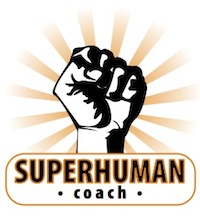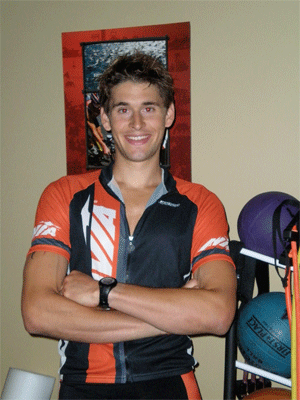This blog is about fitness business.
And if your business interest is in the specific area of endurance athletes or triathlon coaching, then this post is for you.
The paradigm has shifted for triathlon coaches. You may be a triathlete looking for a coach. You may be a triathlete evaluating your current coach. Or you may be a triathlon coach struggling to get better results for your athletes. Whoever you are, it is crucial that you are aware of critical evolutions in the triathlon coaching industry – evolutions that are going to directly effect your success in the sport of triathlon, whether you’re a coach or an athlete.
Triathlon Coaching New Rule #1) Workouts Are Not The Holy Grail.
In the day of training plan wizard writing software, libraries of pre-written triathlon programs, and a glut of free online workouts, it basically takes a chimpanzee to tell a triathlete when to swim, bike and run (that, or good copy-and-paste skills on the computer). With technology, the complete amateur coach can now design training programs that rival the guru expert coaches of triathlon.
So workouts are not the holy grail. Any triathlon coach on the face of the planet can deliver you effective workouts in a timely fashion. But here is the catch: it takes a wise and seasoned triathlon coach to intertwine a triathlete’s swim, bike and run routines with changes in lifestyle, health, social obligations and injury status, and an even more knowledgeable coach to diagnose and correct nutritional and biomechanical deficiencies and errors that are impeding an athlete’s progress.
Do not assume as a triathlon coach that because you give an athlete some semblance of a workout plan each week or each month that you are doing a good job. And do not assume as an athlete that because you are paying a few hundred dollars a month you are getting a customized plan. Is the plan periodized? Does it change with an athlete’s changes in fitness and availability? Does it constantly test and evaluate the athlete, and give the athlete feedback?
If not, it is a lazy plan.
Triathlon Coaching New Rule #2) It’s No Longer About GPS and Heart Rate.
Once upon a time, the only data a triathlon coach inspected was distance, speed, power, heart rate, and occasionally a few more advanced factors and mathematical combinations of those.
This is no longer the case.
A triathlon coach needs to be looking at the recovery status of their athlete, and that should include the ability to examine oxygen saturation status, heart rate variability, hydration, testosterone:cortisol ratios, amino acid levels, and caloric balance.
A triathlon coach needs to be looking at the internal performance factors of their athletes, and that includes iron levels, vitamin D levels, magnesium and electrolyte status, fatty acid ratios, body acidity, candida or yeast, and food allergies and intolerances.
A triathlon coach needs to be able to see and give specific direction to fix locked sacroiliac joints, imbalanced muscles, weak shoulder stabilizers, hypoxic tissue areas, and power deficits.
Can you as a coach do this? Do you as an athlete have these options from your coach? Every parameter I mentioned above is 100% testable and 100% sharable with a coach, whether or not a coach lives in the same town as an athlete. If a coach is not providing these as options to an athlete, the athlete is getting the short end of the stick.
Triathlon Coaching New Rule #3) Teams Are Paramount.
A triathlon coach cannot and should not be a lone wolf. Every coach should be surrounded by a team that can help the athlete get results, and that team should include a sports medicine physician and/or orthopedic surgeon, a chiropractic physician, a registered dietitian or sports nutritionist, a massage therapist, and when necessary, a naturopathic physician.
A triathlon coach must have full access to a team with collective expert knowledge that goes far beyond what you could provide to an athlete on their own. A triathlon coach must be able to call a doctor on the phone and ask them about an athlete they are coaching, check in with a nutritionist to deliver a triathlete’s logged meals, and refer an athlete to a higher power when necessary.
If there is no evidence that a triathlon coach has the ability to reach beyond their knowledge and speak about an athlete’s status with experts in specific healing and nutritional fields, then there is no evidence that the triathlon coach is fully equipped to get ideal results.
Triathlon Coaching New Rule #4) Experience Matters.
Triathlon coaching is becoming quite sexy, and, as a result, throngs of young sports science graduates and multi-sport hobbyists are rushing to obtain certifications with the equivalent of a few local sprint triathlons under their belt. Once a website, a sandwich board, or a Yellow Pages advertisement has been posted, the triathlon coach can then sit back and wait for gullible triathletes to hire their smiling face – the desperate triathletes completely convinced that the word “certified” denotes “expert status”.
Nothing could be further from the truth. In evaluating a triathlon coach, an athlete should look at how many triathlons the coach has done, the distance of those events, the final results of those events, the number of years spent coaching, the number and range of athletes coached, and even the time spent traveling and experiencing the unique changes travel can impose upon circadian rhythm, hydration status, and performance levels.
When it comes to triathlon, a piece of paper or certification stamp means next to nothing. If a coach can’t tell an athlete what to do when they drop their electrolyte capsules during a race and need an alternate salt source without flipping their gut, the coach needs to go do a few more races and spend a bit more time in the trenches.
Triathlon Coaching New Rule #5) Communicate Or Die.
A triathlon coach must be able to respond within 24 hours to changes in the triathlete’s health, injury status or social life and make instant changes in that athlete’s program to allow the training plan to effectively continue without interruption of the final goal. The coach must also be able to dynamically program an athlete’s workouts on a weekly basis, constantly moving and shuffling the swimming, cycling and running workouts based on the athlete’s needs, while still achieving the big picture goal.
In the age of the internet, Skype, e-mail, text messaging and cell phones, there is no excuse for a triathlon coach to not be able to communicate with an athlete and instantly respond to an athlete’s needs. Do you, as a triathlon coach, provide this type of communication to your athletes? Do you, as an athlete, get this type of communication from your triathlon coach? If not, then a line needs to be fixed or replaced.
So those, folks, are the new rules of triathlon coaching. The triathlon coach should take these words to heart and examine their business model to determine whether they are doing everything possible to get the best results for the athlete, and the triathlete should give serious thought as to whether the money being spent on a triathlon coach is getting them everything they need to reach their results happily…or just a plan in a can.
Ben Greenfield has been coaching athletes for over a decade from http://www.pacificfit.net, and is author of the modern triathlon coaching manual, “How To Be A Triathlon Coach”, at http://www.triathloncoachguide.com




